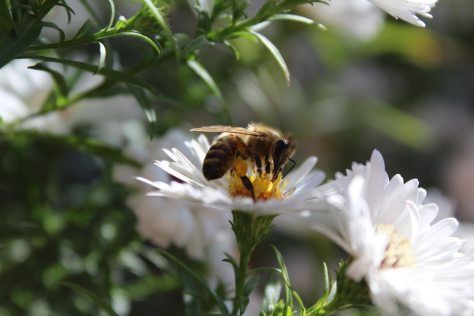By Elaine Spacher, Executive Director
Tanglewood Nature Center & Museum
We have had some great themes over the past 5 years the Garden of Fire has been in operation. Water, wind, earth, fire…but this year’s theme of Powerful Pollinators is by far my personal favorite! Partners in the Garden of Fire will spend the summer teaching local youth about the importance of pollinators on Earth; a timely and essential subject.
Pollinators play a powerful role in the functioning of our food web and humans literally would not survive without them. Pollinators range from many types of insects – bees, butterflies, moths, beetles and flies, to bats and birds. Pollination happens when pollen is moved within individual flowers, or carried from flower to flower by pollinators. Worldwide, approximately 1,000 plants grown for food, drink, fiber (for clothing and other uses), spices, and medicines have to be pollinated by animals.
Food and drink made with the help of pollinators includes: apples, blueberries, chocolate, coffee, honey, melons, peaches, potatoes, pumpkins, vanilla, almonds, and tequila. Most crops that our ag animals (cows, pigs, chickens) eat are also here because of our pollinators.

In the US, pollination by honey bees, native bees, and other insects produces $40 billion worth of products every year.
The most prolific pollinators are the honey bees. Honey bees are not native to the US, they were originally brought here in the 1600s by colonists from Europe, mostly for their ability to produce honey. Most of the honey bees we see today are of Italian and German descent. Honey bees have a fascinating life history and once you know about it, it’s hard to not love them. Although some people have bee fear, and some are allergic, honey bees often get a bad rap for being dangerous. Honey bees are pretty docile and will only sting when they feel threatened. They die after they sting, so stinging is saved for something serious.

In a honey bee colony, the girls do most of the work (thus are called workers) – they are the nurses, the cleaners, the guards, the collectors, the honey-makers, and the keepers of the Queen. The males, called drones, must leave and mate with a queen from another colony. The workers only allow the drones to live if there is enough food available. The Queen is the longest-lived in the hive and she lays all the eggs so that the colony can multiply and thrive. The communication between bees is sophisticated and efficient. They can communicate where food is, when they need to make a new queen, when to swarm, when danger is near, and much more. Honey bees collect pollen and nectar for the survival of their colony, and in the process, their hairy bodies deposit pollen and facilitate fertilization so that plants can make fruits and seeds and therefore new plants.

Learning about bees and how to keep them numerous and healthy is a smart thing to do. If you have been paying attention, you might know that bees are in trouble. There is evidence that the worldwide decline of bees is happening due to a variety of factors- all human-related. Bees suffer from habitat loss, chemical poisoning, disease and parasites. The United States has lost more than half of the honey bee colonies managed by beekeepers in the past 10 years. This is an alarming thing and we need to do all we can to reverse this. So, if you like to eat and drink, and you want to do something to help our honey bees, what can you do?
- Plant for pollinators – especially plants that provide nectar and food for pollinators
- Install houses for bats and native bees, or even become a beekeeper yourself!
- Supply salt or mineral licks for butterflies and water for all wildlife
- Reduce or cease pesticide use
- Put in more flower beds and less lawn
And most importantly, educate yourself and others so we can all work to keep our Powerful Pollinators alive and doing their good work for our survival.

